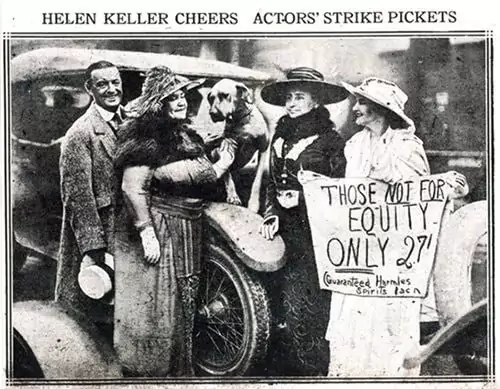The following review example can serve as a guide for students trying to find inspiration when writing an assignment on Helen Keller, her role in American literature, and the social life of the country.

✅ AI Essay Writer ✅ AI Detector ✅ Plagchecker ✅ Paraphraser
✅ Summarizer ✅ Citation Generator
What do we know about Helen Keller? Taking from school, students are aware that
Helen Keller was a remarkable American with disabilities. Despite the challenges, she learned to read and speak, becoming an inspiring writer and educator. Keller worked hard for the rights of blind people and women, helping to start the American Civil Liberties Union in 1920. She also supported the American Foundation for the Blind and raised a lot of money for them.
In this article, we will learn about the history you did not learn during your history lessons and answer questions such as “Is Helen Keller racist?” and “What was Helen Keller famous for?”.
Helen Keller: Socialist, anti-racist, disability rights activist
Helen Keller definitely engraved her name in American history: Her radical life, and courageous actions were noteworthy, earning her a symbol of “heroic disability” (a rather stereotypical, though).
Helen Keller knew her worth and could stand up for herself since early childhood. Keller grew up on a farm during a time when racism was rampant, after the Reconstruction era in the South. This was when plantation owners in the South and business people in the North made deals that essentially forced newly freed Black people back into slave-like conditions.

However, as an adult, Keller strongly opposed racism. She actively supported the NAACP, a new organization fighting for Black people’s rights, and even wrote for its magazine, “The Crisis.” She continued her fight against segregation through protests and rallies well into the 1950s, even as she got older.
“I am a Socialist because only under socialism can everyone obtain the right to work and be happy.”
Keller was active in the early civil rights movement during the 1940s and 1950s. She attended meetings and protests to fight against racism. After talking at a meeting in Danbury to support justice for Black people in Connecticut, she shared with a friend how deeply ashamed she felt about the ongoing racial injustice.
“This revolt has never slumbered within me since I began to notice for myself how they are degraded, and with what cold-blooded deliberation the keys of knowledge, self-reliance and well-paid employment are taken from them. . . . It stabs me to the soul to recall my visits to schools for the colored blind which were shockingly backward, and what a hard struggle it was for them to obtain worthwhile instruction and profitable work because of race prejudice. The continued lynchings and other crimes against Negroes, whether in New England or the South, and the unspeakable political exponents of white supremacy, according to all recorded history, augur ill for America’s future.”
Schools often skip teaching about Keller’s adult life because she was part of groups considered too extreme in American history. She joined the Socialist Party and was in touch with Eugene Debs, a key member and five-time presidential candidate. On top of everything, Keller read works by Marx. Her connections with these leftist groups caught the FBI’s attention, who watched her for any links to the Communist Party.
Yet, to some activists in the Black disability community, like Anita Cameron, Keller isn’t seen as radical. They view her as just another white person with privileges, despite her disabilities.
“Just another, despite disabilities, privileged white person, and yet another example of history telling the story of privileged white Americans.”
This perspective is part of a broader critique of how history often focuses on privileged white Americans. Critics also point to Keller’s early writings, which showed support for the now-outdated eugenics theories, and her friendship with Alexander Graham Bell, a supporter of this movement. However, Helen Selsdon, an archivist at the American Foundation for the Blind, notes that Keller later changed her views on these issues.
Final Thoughts
“Was Helen Keller racist?” Simply put, Helen Keller was not racist. She actively opposed racism, supporting the NAACP and fighting against segregation through protests and rallies. While some view her as a privileged white person, her efforts in the civil rights movement highlight her commitment to racial justice.
Follow us on Reddit for more insights and updates.





Comments (0)
Welcome to A*Help comments!
We’re all about debate and discussion at A*Help.
We value the diverse opinions of users, so you may find points of view that you don’t agree with. And that’s cool. However, there are certain things we’re not OK with: attempts to manipulate our data in any way, for example, or the posting of discriminative, offensive, hateful, or disparaging material.